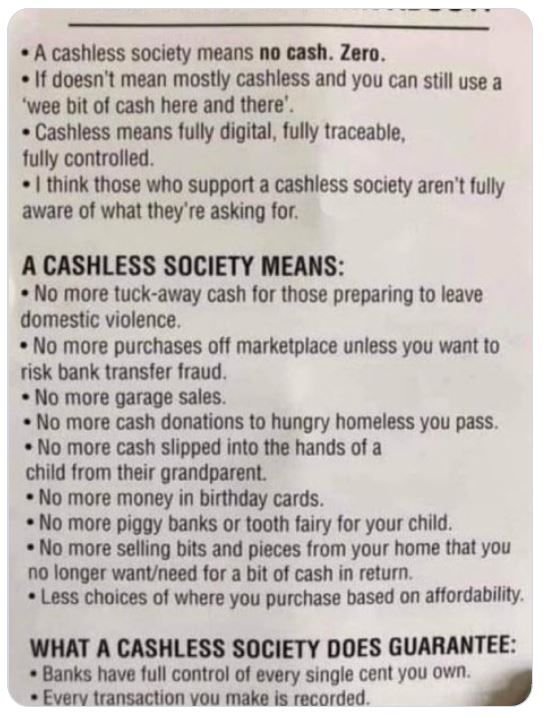this post was submitted on 06 Jun 2024
494 points (84.1% liked)
Privacy
833 readers
7 users here now
Privacy is the ability for an individual or group to seclude themselves or information about themselves, and thereby express themselves selectively.
Rules
- Don't do unto others what you don't want done unto you.
- No Porn, Gore, or NSFW content. Instant Ban.
- No Spamming, Trolling or Unsolicited Ads. Instant Ban.
- Stay on topic in a community. Please reach out to an admin to create a new community.
founded 2 years ago
MODERATORS
you are viewing a single comment's thread
view the rest of the comments
view the rest of the comments

If you deposit your money at a bank, or PayPal, or some online digital bank transfer service,** you do not have your money anymore.** They have your money.
Now you have some kind of contract that says they'll give you your money on demand. But sometimes they won't give it to you when you want it. If any judge or cop wants to see every person or business I've ever transacted with the bank will happily give it over.
On the other hand, cash is cash. If I possess it, then I have it. And nobody gets to know how much, or how suspicious, or with whom I'm transacting.
On the other other hand, in the U.S. if you are pulled over by the police with cash, they can choose to seize that cash just because carrying cash looks suspicious. They don't need to charge you with a crime. If the cash was in a bank, they'd need to go through a lot more process to seize it -- the cops typically can't just walk into the bank and demand it.
Yea, but that's a different problem.
If you deposit money at a bank, it is covered by federal deposit protection insurance (up to some limit that varies by country but generally in the range of $100k-$250k), so you are guaranteed to be able to get it back no matter what. Even if the bank fails. Banks are subject to extremely strict regulation to protect consumers and make sure you have access to your funds
PayPal is not a bank, it's an EMI (e-money institution), but those are heavily regulated to protect consumers. Your funds are not covered by deposit protection insurance, but as an EMI they have to keep your money in a safeguarding account at a real bank and they can't use it themselves, so in case PayPal fails you will still get your money back. Revolut in the UK is another example of a non-bank EMI
Time matters. Those insurance claims take months to process and they only cover bankruptcy (which is the least likely reason a bank denies you access to funds).
The copy of my ID card that the bank had on file expired. I renewed it on time but did not think to update the bank with a new copy. The bank’s way of communicating to me that their records of my card were out of date was to freeze my account. Boom, just like that, I have no money all of the sudden. I don’t recall the time of day it happened, but if it had happened on a Friday night I would not have access to my money until I appear in person at the bank Monday morning
assuming it’s even possible to get off work. At that time, I kept an empty fridge.. only eating on the go. Had I not had cash on hand, getting food could have been a struggle.
LOL! Those so-called strictly enforced banking regs are not for us. Banks are scared shitless of AML/KYC shit hitting the fan. Banks laugh at the consumer protection variety of regs with reckless disregard. It’s a joke. I’ve reported banks in breach of consumer rights. The bank’s regulators do fuck all. One reculator responded to me and said “why don’t you switch banks”. I shit you not. That came from a regulator who’s job it was to enforce a law that the bank was breaking.
No, that’s not how it is. PayPal has a reputation for copious extremely out of whack “anti-fraud” false positives. I was burnt by it. Paypal blocked my acct and kept my money. There are many similar complaints.
https://git.disroot.org/cyberMonk/liberethos_paradigm/src/branch/master/rap_sheets/paypal.md
What country are you in? If it's the USA, then yeah my understanding is that regulations are a lot worse/weaker there. The stuff you described wouldn't fly if it was a UK or EU bank I believe. SVB failing wouldn't have happened here either (nor would it have in the USA before Trump)
Yeah PayPal are terrible lol, I've got some horror stories of my own